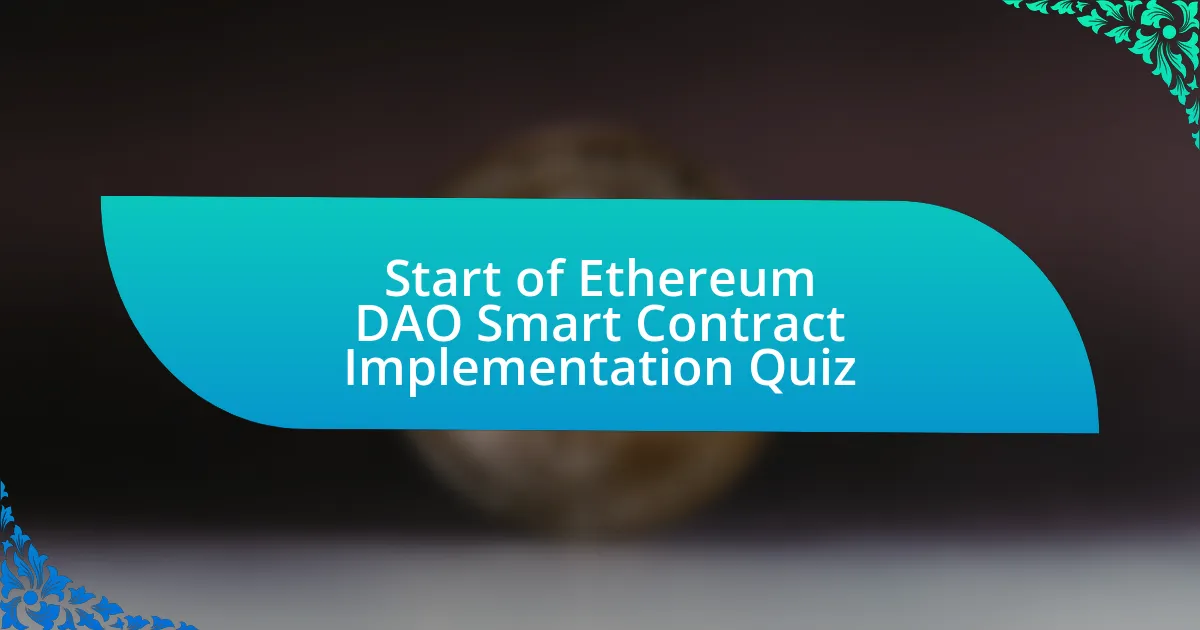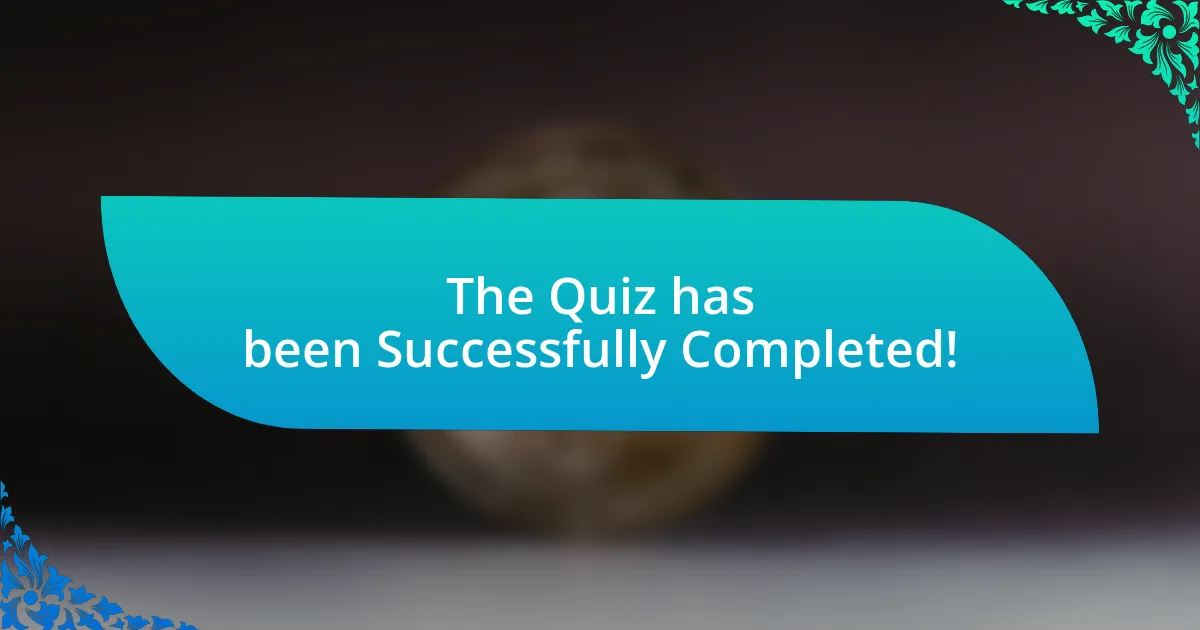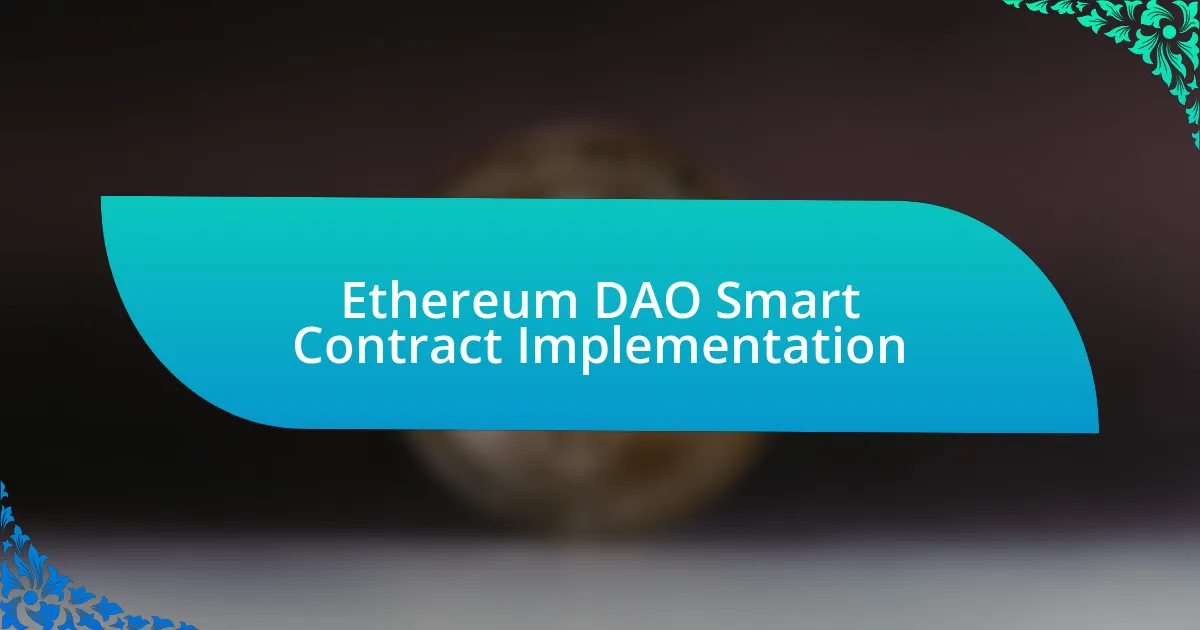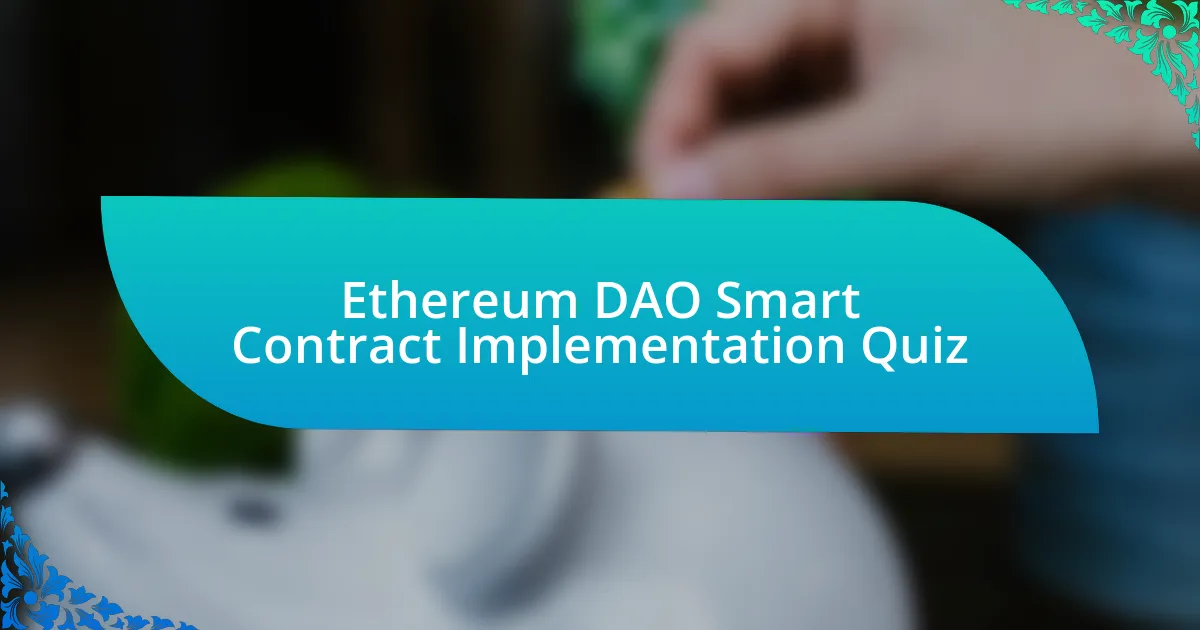
Start of Ethereum DAO Smart Contract Implementation Quiz
1. What is the backbone of a DAO?
- The backbone of a DAO is its marketing strategy.
- The backbone of a DAO is its smart contract.
- The backbone of a DAO is its user interface.
- The backbone of a DAO is its administration team.
2. What does the smart contract in a DAO define?
- The smart contract in a DAO defines the rules of the organization and holds the group`s treasury.
- The smart contract in a DAO defines the physical location of the organization and its headquarters.
- The smart contract in a DAO defines the members’ identities and personal information.
- The smart contract in a DAO defines the prices of products and services offered.
3. How are the rules of a DAO changed?
- The rules are modified automatically by the system.
- The rules of a DAO can never be changed once established.
- The rules are changed by a single leader`s decision.
- The rules of a DAO are changed by a vote.
4. What happens if someone tries to do something not covered by the rules in the code?
- It will fail.
- It will be ignored.
- It will succeed.
- It will require manual approval.
5. Who can spend the money in a DAO`s treasury?
- The founder alone has the right to allocate treasury funds.
- Only the group can spend the money in a DAO`s treasury after approval.
- External auditors are authorized to spend money in the treasury.
- Individual members can spend the money freely without consent.
6. Why are smart contracts tamper-proof once they go live on Ethereum?
- Smart contracts are tamper-proof due to encryption limiting access.
- Smart contracts are tamper-proof because they are managed by a single authority.
- Smart contracts are tamper-proof once they go live on Ethereum because everything is public.
- Smart contracts are tamper-proof because they are stored offline.
7. What is the primary reason Ethereum is the perfect foundation for DAOs?
- Ethereum’s complex programming language creates barriers for developers.
- Ethereum’s high transaction fees limit participation in DAOs.
- Ethereum’s decentralized consensus and established network make it the perfect foundation for DAOs.
- Ethereum’s reliance on centralized control ensures stakeholder trust.
8. How do smart contracts manage group funds in a DAO?
- Smart contracts manage group funds in a DAO by allowing unrestricted access to everyone.
- Smart contracts manage group funds in a DAO by requiring manual transactions for every transfer.
- Smart contracts manage group funds in a DAO by sending and receiving funds automatically.
- Smart contracts manage group funds in a DAO by performing all actions through a central authority.
9. What is the role of the Ethereum community in supporting DAOs?
- The Ethereum community creates DAOs independently without input.
- The Ethereum community solely funds DAOs without oversight.
- The Ethereum community restricts access to DAOs for new members.
- The Ethereum community provides best practices and support systems for DAOs.
10. How do traditional organizations differ from DAOs?
- Traditional organizations have no formal structure or hierarchy.
- Traditional organizations operate on blockchain technology.
- Traditional organizations rely on centralized management and decision-making.
- Traditional organizations treat all members equally without roles.
11. What blockchain platforms are commonly used for building DAOs?
- Stellar
- Ripple
- Ethereum
- Solana
12. How do smart contracts function within a DAO?
- Smart contracts only manage the user interface of the DAO and do not handle financial transactions.
- Smart contracts are manual tools that require human intervention for every decision-making process in a DAO.
- Smart contracts simply act as a ledger, recording decisions made by members without executing them.
- Smart contracts govern everything from voting to fund management in a DAO and automatically execute predefined rules and protocols.
13. What governance models are commonly used in DAOs?
- DAOs exclusively use a centralized governance model controlled by a single leader.
- DAOs use community-driven governance models with token-based voting systems, including direct democracy, liquid democracy, and delegated voting.
- DAOs implement only hierarchical governance structures without member input.
- DAOs are governed solely by external regulatory bodies.
14. What are the major security risks associated with DAOs?
- Major security risks are competition from other platforms, lack of community support, and legal disputes.
- Major security risks include bugs in smart contract code, governance attacks, and oracle manipulation.
- Major security risks consist of high transaction fees, unregulated markets, and slow transaction speeds.
- Major security risks involve user error, market volatility, and limited user participation.
15. How would you handle a critical bug in a DAO’s smart contract?
- You would delete the smart contract and create a new one without notice.
- You would freeze the affected contract or treasury, submit a new proposal, and seek community consensus to deploy a new contract or patch the existing one.
- You would ignore the bug and let it run its course without intervention.
- You would manually reset the contract by altering the code directly.
16. What experience do you need to have working with DAOs?
- You need experience managing traditional corporate structures and marketing strategies.
- You need a degree in computer engineering or software development only.
- You need extensive knowledge of international market trends and finance only.
- You need hands-on experience participating in governance, developing smart contracts, or contributing to DAO-related research.
17. What is the primary benefit of creating a DAO?
- The primary benefit is the reliance on smart contracts, which automate processes, ensure transparency, and reduce the need for intermediaries.
- The primary benefit is exclusive control over all resources without external influence.
- The primary benefit is creating unlimited profit opportunities for every member.
- The primary benefit is the ability to have a CEO who makes all decisions efficiently.
18. Why is Ethereum a prominent choice for DAO development?
- Ethereum`s exclusive use of private contracts supports DAO development effectively.
- Ethereum`s focus on high transaction speeds makes it ideal for DAOs.
- Ethereum`s central authority manages DAOs efficiently and reliably.
- Ethereum’s decentralized consensus and established network make it the perfect foundation for DAOs.
19. What characteristic of Ethereum smart contracts prevents their code from being altered once deployed?
- Immutability
- Scalability
- Interoperability
- Flexibility
20. How does the transparency of Ethereum smart contracts contribute to establishing trust among participants?
- Smart contracts operate in secrecy, which builds confidence in the process.
- The transparency allows all participants to view the contract code and its execution history, fostering trust among parties.
- The code can only be accessed by developers, limiting trust among others.
- Transparency complicates the understanding of contracts, leading to distrust.
21. What makes smart contracts deployed on the Ethereum blockchain invulnerable to hacking or unauthorized changes?
- The immutability of smart contracts on Ethereum makes them invulnerable to hacking or unauthorized changes.
- The complexity of smart contracts prevents hacking attempts.
- Anonymous users cannot access smart contracts on the Ethereum network.
- Smart contracts can be easily updated to fix vulnerabilities.
22. What aspect of the Ethereum blockchain ensures that the execution of smart contracts is not reliant on a single authority or server?
- The reliance on a single database server ensures that the execution of smart contracts is secure and controlled.
- The centralized structure of the Ethereum blockchain ensures that the execution of smart contracts is efficient and swift.
- The private nature of the Ethereum blockchain ensures that the execution of smart contracts is only accessible to authorized users.
- The decentralized nature of the Ethereum blockchain ensures that the execution of smart contracts is not reliant on a single authority or server.
23. How does the inherent transparency of Ethereum smart contracts help establish trust among participants?
- The inherent transparency makes the smart contracts private, creating trust through confidentiality.
- The inherent transparency allows all participants to view the contract code and its execution history, fostering trust among parties.
- The inherent transparency requires all participants to submit proposals for changes, enabling trust through bureaucracy.
- The inherent transparency prevents participants from accessing the contract code, ensuring trust through secrecy.
24. What is the role of smart contracts in automating governance and decision-making within a DAO?
- Smart contracts are used solely for tracking financial transactions between members of the DAO.
- Smart contracts only store data related to member contributions and participation in the DAO.
- Smart contracts automate governance and decision-making by executing predefined rules and protocols transparently and tamper-proofly.
- Smart contracts manually process votes and approvals from DAO members in a centralized manner.
25. What is the significance of conducting thorough testing and debugging on a testnet environment before deploying a DAO?
- Conducting testing on a testnet is unnecessary since DAOs are self-governing and self-sustaining.
- Testing on a testnet is only important for non-DAO projects without smart contracts involved.
- Thorough testing and debugging on a testnet ensures smart contracts perform correctly and minimizes risks of vulnerabilities.
- Debugging on a testnet is irrelevant because smart contracts do not have any potential issues before going live.
26. How do you configure the Moralis Web3 API key for facilitating interaction with the Ethereum blockchain and accessing DeFi protocols?
- You configure the Moralis Web3 API key mainly for mining cryptocurrency.
- You configure the Moralis Web3 API key to simplify blockchain development and integration processes.
- You configure the Moralis Web3 API key using a centralized server for data storage.
- You configure the Moralis Web3 API key to create traditional web applications.
27. What is the purpose of running the backend and frontend components of a DApp?
- The purpose is to minimize the transaction fees for users engaging with the DApp.
- The purpose is to store user data locally on the server for easier access.
- The purpose is to ensure the blockchain`s security and integrity against attacks.
- The purpose is to enable users to interact with the DAO’s functionalities seamlessly through the user interface.
28. What is the key feature of Ethereum smart contracts that increases their reliability?
- Centralized control
- Self-executing nature
- Manual approval
- Limited access
29. What makes smart contracts deployed on the Ethereum blockchain immune to unauthorized changes?
- The use of private keys ensures smart contracts are immune to unauthorized changes.
- The requirement of multiple signatures makes smart contracts immune to unauthorized changes.
- The immutability of smart contracts on Ethereum makes them immune to unauthorized changes.
- The complexity of smart contracts prevents unauthorized changes from happening.
30. How does the decentralized mechanism of smart contracts on Ethereum mitigate risks associated with data loss or server failures?
- The decentralized mechanism requires manual updates from administrators to prevent data loss and server issues.
- The decentralized mechanism mitigates risks by relying on multiple nodes to verify contract execution, enhancing security against single points of failure.
- The decentralized mechanism relies on a single server to manage contract execution, increasing the likelihood of downtime.
- The decentralized mechanism uses strong encryption on one server to protect against data loss and failures.

The Quiz has been Successfully Completed!
Congratulations on completing the quiz on Ethereum DAO Smart Contract Implementation! This exercise has likely deepened your understanding of how DAOs function and the critical role that smart contracts play within them. By engaging with the material, you might have gained insights into the mechanics of governance, the importance of security, and the fundamental principles of decentralized management. Each question posed a challenge that could spark new thoughts about blockchain technology.
Through this quiz, you’ve explored key concepts that lay the groundwork for understanding Ethereum’s innovative capabilities. Perhaps you learned about various implementation techniques, the significance of audits, and different frameworks that can optimize smart contract development. This knowledge is pivotal in navigating the evolving landscape of decentralized applications and decentralized finance.
We invite you to continue your journey of learning by checking the next section on this page, which delves deeper into Ethereum DAO Smart Contract Implementation. This resource is designed to expand your insights and provide a clearer roadmap of practical applications. Dive in to unlock further knowledge and enhance your grasp of this exciting field!

Ethereum DAO Smart Contract Implementation
Introduction to Ethereum and DAOs
Ethereum is a decentralized blockchain platform that enables developers to create smart contracts and decentralized applications (dApps). A Decentralized Autonomous Organization (DAO) operates through smart contracts, allowing decision-making to be automated without central authority. DAOs leverage Ethereum’s capabilities to manage governance and fiscal activities transparently. The combination of Ethereum and DAOs provides a framework for community-driven projects, enabling collective decision-making through token-based voting mechanisms.
Understanding Smart Contracts on Ethereum
Smart contracts are self-executing contracts with the terms of the agreement directly written into code. On Ethereum, they run on a blockchain and facilitate, verify, or enforce the negotiation or performance of a contract. Smart contracts on Ethereum are immutable and publicly accessible, ensuring transparency and security. These attributes allow for reliable execution of DAO governance, as transactions and changes in state happen automatically based on predefined rules.
DAO Governance Mechanisms
DAO governance mechanisms determine how decisions are made and executed within the organization. Typically, governance tokens are issued to members, allowing them to vote on proposals. Common structures include one-token-one-vote or quadratic voting, enhancing fairness and representation. Smart contracts execute decisions based on the outcome of these votes. This decentralized approach ensures that all stakeholders have a voice, and the process is resistant to manipulation.
Implementing a DAO Smart Contract
Implementing a DAO smart contract involves coding the governance structures, voting mechanisms, and treasury management rules. Developers use programming languages like Solidity to write the smart contract. Key considerations include security audits to ensure there are no vulnerabilities, and scalability options to handle a growing user base. Once deployed on the Ethereum blockchain, the smart contract becomes immutable and operates autonomously, following the coded rules.
Real-World Examples of Ethereum DAO Implementations
Several projects exemplify successful Ethereum DAO implementations. MakerDAO, for instance, utilizes a smart contract system to govern the issuance of its stablecoin, DAI. Members of MakerDAO use governance tokens to vote on critical issues like collateral types and risk parameters. Another example is Compound, which allows users to lend and borrow cryptocurrencies, governed by its community through DAO principles. Both projects highlight how DAOs can manage complex financial operations transparently on the Ethereum blockchain.
What is Ethereum DAO Smart Contract Implementation?
Ethereum DAO Smart Contract Implementation refers to the process of creating decentralized autonomous organizations (DAOs) using Ethereum’s blockchain through smart contracts. These smart contracts define the rules and governance of the organization, enabling automated decision-making and fund management without central authority. The first major example of this was the DAO launched in 2016, which raised over $150 million in Ether before its exploit.
How is Ethereum DAO Smart Contract Implementation executed?
Ethereum DAO Smart Contract Implementation is executed by writing code in Solidity, Ethereum’s programming language. Developers deploy the smart contract on the Ethereum network, which facilitates member voting, proposals, and fund distribution. Key functionalities include contribution tracking, voting mechanisms, and automated decision execution. Once deployed, the contract operates independently, governed by the rules defined within its code.
Where can one find resources for Ethereum DAO Smart Contract Implementation?
Resources for Ethereum DAO Smart Contract Implementation can be found on the Ethereum Foundation’s website, GitHub repositories, and various educational platforms such as CryptoZombies and Coursera. The Ethereum community maintains forums like Ethereum Stack Exchange and r/ethdev for discussions and assistance. Additionally, developer documentation on the Ethereum website provides comprehensive guidelines on smart contract development.
When was Ethereum DAO Smart Contract Implementation first popularized?
Ethereum DAO Smart Contract Implementation was first popularized with the launch of The DAO in April 2016. This was a significant moment in blockchain history, as it demonstrated the potential of decentralized governance. The DAO attracted substantial funding but was famously hacked in June 2016, leading to a hard fork in the Ethereum blockchain to recover lost funds.
Who typically develops Ethereum DAO Smart Contracts?
Ethereum DAO Smart Contracts are typically developed by blockchain developers and programmers proficient in Solidity. These developers may work within startups, established companies, or as freelancers in the decentralized finance (DeFi) space. Many of them are part of the open-source community, contributing to the evolution of DAOs and smart contract technology.

